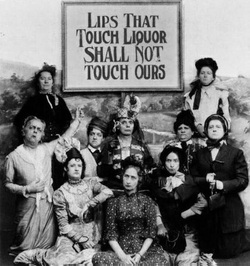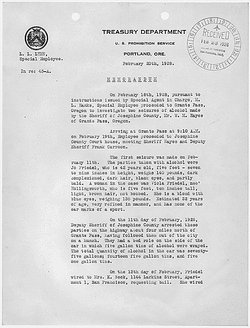The Rise of Gangsters and Bootleggers

The 1920s brought a lot of changes to this country, but one change did not go over very well. On January 16, 1920, the 18th amendment went into effect. The 18th amendment prohibited the selling of alcohol and defined "intoxicating liquors". This amendment was long coming, however. In 1893, the Anti-Saloon League was formed in Oberlin, Ohio. In 1895, it grew from a state organization to a powerful, national organization. After some years, it finally announced its campaign in 1913 to achieve national prohibition through a constitutional amendment. The organization seized the opportunity during World War 1 when they said that it would be patriotic to conserve grain for the war effort and therefore not to drink alcohol. They also argued that is a sober soldier was a better soldier and a sober factory worker was a better factory worker, then prohibition made perfect sense. Finally, the 18th amendment was passed on December 18, 1917 and was ratified two years later. Along with this amendment came the Volstead Act, which defined what an intoxicating liquor was and outlined specific punishments for violations. Anything with more that 1% alcohol was illegal. The first offense was six months in jail and a $1000 fine, while the second offense was five years in jail and a $10,000 fine. The 18th amendment proved not to be extremely effective because it was very hard for the government to enforce. While some towns did go "dry", others resorted to making their own. The Prohibiton Bureau, which was part of the Department of Justice, was always understaffed and under funded, so enforcement was never consistent. "Padlock Laws" also tried to make it easier for the government to enforce these laws. These laws allowed agents to close down an establishment that was serving alcohol for up to a year. A term for one of these places would be speakeasy, which was a saloon or nightclub that sold alcoholic beverages illegally. The government could also seize any automobile used to transport liquor illegally. A bootlegger was someone that transported, made, or sold liquor illegally. Al Capone and Bonnie and Clyde were some of the people that contributed to these crimes, along with bank robberies. These gangsters stole millions from major cities like Chicago. The 1920s have such a big reputation for gangsters and crime because they managed to evade the police and rob people of millions; Al Capone even bribed the police. These actions help support the idea that the government and temperance leaders went too far because these people started taking over the nation, causing more harm than if alcohol was legal. The passing of the 18th amendment caused the country much grief, which meant that it was not necessary to pass it. Using the Thinking like a Historian skill of "Cause and Effect" can help make it easier to understand why the gangsters and bootleggers took action. Because of the law against alcohol, bootleggers were forced to create their own drinks and gangsters sold the drinks for large amounts of money. These events caused much grief for common people because there were many shootings and bank robberies. Because alcohol is not illegal today, we have been able to avoid huge bank robberies and the take over of gangsters and bootleggers.
Essential Question: The passing of the 18th amendment was an over-reaction to the problem with alcohol. The actions of gangsters/bootleggers support this position because they were forced to make their own drinks, which caused more crime and more harm than if alcohol was still legal.
Author-L. L. Lynn, a special employee of the Treasury Department US Prohibition Service.
Place and Time-This was written February 20th, 1928 in Portland, Oregon. Alcohol was still illegal during this time.
Prior Knowledge-The 18th amendment was not generally liked by the public, which forced them to make their own liquor. This led to smuggling it across borders.
Place and Time-This was written February 20th, 1928 in Portland, Oregon. Alcohol was still illegal during this time.
Prior Knowledge-The 18th amendment was not generally liked by the public, which forced them to make their own liquor. This led to smuggling it across borders.
Audience-The intended audience is the state of California.
Reason-It was produced because there was a problem with smuggling illegal liquors across the borders.
The Main Idea-There is a problem with this and we need to learn how to solve it.
Significance-This shows how even there there was a law against alcohol, people still did anything to get it. The law really did not help at all.
Reason-It was produced because there was a problem with smuggling illegal liquors across the borders.
The Main Idea-There is a problem with this and we need to learn how to solve it.
Significance-This shows how even there there was a law against alcohol, people still did anything to get it. The law really did not help at all.

